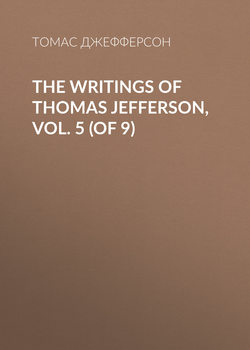Читать книгу The Writings of Thomas Jefferson, Vol. 5 (of 9) - Томас Джефферсон, Thomas Jefferson - Страница 53
TO MR. BOWDOIN
ОглавлениеWashington, April 2, 1807.
Dear Sir,—I wrote you on the 10th of July last; but neither your letter of October the 20th, nor that of November the 15th mentioning the receipt of it, I fear it has miscarried. I therefore now enclose a duplicate. As that was to go under cover of the Secretary of State's despatches by any vessel going from our distant ports, I retained the polygraph therein mentioned for a safer conveyance. None such has occurred till now, that the United States armed brig the Wasp, on her way to the Mediterranean is to touch at Falmouth, with despatches for our ministers at London and at Brest, with others for yourself and General Armstrong.
You heard in due time from London of the signature of a treaty there between Great Britain and the United States. By a letter we received in January from our ministers at London, we found they were making up their minds to sign a treaty, in which no provision was made against the impressment of our seamen, contenting themselves with a note received in the course of their correspondence, from the British negotiators, assuring them of the discretion with which impressments should be conducted, which could be construed into a covenant only by inferences, against which its omission in the treaty was a strong inference; and in its terms totally unsatisfactory. By a letter of February the 3d, they were immediately informed that no treaty, not containing a satisfactory article on that head, would be ratified, and desiring them to resume the negotiations on that point. The treaty having come to us actually in the inadmissible shape apprehended, we, of course, hold it up until we know the result of the instructions of February the 3d. I have but little expectation that the British government will retire from their habitual wrongs in the impressment of our seamen, and am certain, that without that, we will never tie up our hands by treaty, from the right of passing a non-importation or non-intercourse act, to make it her interest to become just. This may bring on a war of commercial restrictions. To show, however, the sincerity of our desire for conciliation, I have suspended the non-importation act. This state of things should be understood at Paris, and every effort used on your part to accommodate our differences with Spain, under the auspices of France, with whom it is all important that we should stand in terms of the strictest cordiality. In fact, we are to depend on her and Russia for the establishment of neutral rights by the treaty of peace, among which should be that of taking no persons by a belligerent out of a neutral ship, unless they be the soldiers of an enemy. Never did a nation act towards another with more perfidy and injustice than Spain has constantly practised against us: and if we have kept our hands off of her till now, it has been purely out of respect to France, and from the value we set on the friendship of France. We expect, therefore, from the friendship of the Emperor, that he will either compel Spain to do us justice, or abandon her to us. We ask but one month to be in possession of the city of Mexico.
No better proof of the good faith of the United States could have been given, than the vigor with which we have acted, and the expense incurred, in suppressing the enterprise meditated lately by Burr against Mexico. Although at first, he proposed a separation of the western country, and on that ground received encouragement and aid from Yrujo, according to the usual spirit of his government towards us, yet he very early saw that the fidelity of the western country was not to be shaken, and turned himself wholly towards Mexico. And so popular is an enterprise on that country in this, that we had only to lie still, and he would have had followers enough to have been in the city of Mexico in six weeks. You have doubtless seen my several messages to Congress, which give a faithful narrative of that conspiracy. Burr himself, after being disarmed by our endeavors of all his followers, escaped from the custody of the court of Mississippi, but was taken near Fort Stoddart, making his way to Mobile, by some country people, who brought him on as a prisoner to Richmond, where he is now under a course for trial. Hitherto we have believed our law to be, that suspicion on probable grounds was sufficient cause to commit a person for trial, allowing time to collect witnesses till the trial. But the judges here have decided, that conclusive evidence of guilt must be ready in the moment of arrest, or they will discharge the malefactor. If this is still insisted on, Burr will be discharged; because his crimes having been sown from Maine, through the whole line of the western waters, to New Orleans, we cannot bring the witnesses here under four months. The fact is, that the federalists make Burr's cause their own, and exert their whole influence to shield him from punishment, as they did the adherents of Miranda. And it is unfortunate that federalism is still predominant in our judiciary department, which is consequently in opposition to the legislative and executive branches, and is able to baffle their measures often.
Accept my friendly salutations, and assurances of great esteem and respect.
